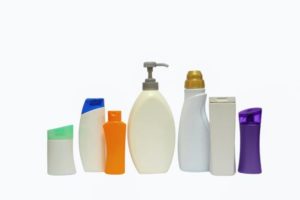 For years there has been much concern over chemicals that act as endocrine disruptors (hormone disruptors) in the personal products that we use on a daily basis. One big concern is whether these chemicals, such as parabens and phthalates, are causing breast cancer (as well as other harmful health effects). Because whatever you use on your skin, will get into you.
For years there has been much concern over chemicals that act as endocrine disruptors (hormone disruptors) in the personal products that we use on a daily basis. One big concern is whether these chemicals, such as parabens and phthalates, are causing breast cancer (as well as other harmful health effects). Because whatever you use on your skin, will get into you.
A recent study looking at these harmful chemicals found that women switching to paraben and phthalate free cosmetic products had a quick effect (within 28 days) on lowering their levels in the body (blood, urine, breast tissue cells). Which then resulted in lowering breast cancer markers to a "normal" expression. Wowza!
What you can do: Check the ingredients in the lotions you use. Are there parabens and phthalates in it? Spend your money on safe lotions and other personal products. Go to EWG (ewg.org) or mamavation.com for lists of safe products. Also: Ways to lower your exposure to harmful chemicals
For example, the commonly used lotion Lubriderm to this day has several types of parabens (e.g., methylparaben) in it. No, no, no... Why are they still in the lotion? Note that our government is not protecting us from these harmful chemicals. (Instead Big Business and big money is more important.)
From Environmental Health News:
Switching to phthalate and paraben-free personal care products could reduce the risk of developing breast cancer, according to new research.
It's well established that high estrogen exposure is a major breast cancer risk factor. Endocrine-disrupting chemicals that mimic estrogen, also known as xenoestrogens, have been associated with increased breast cancer risk, even at low doses. The two most common xenoestrogens, phthalatesand parabens, are used widely in personal care products such as shampoo, deodorant, lotion, nail polish, fragrances and more. While most toxicology cancer research uses animal models or cancer cell lines, the new study, published in Chemosphere, aimed to understand how reducing real-world exposure to these toxics affects early markers of breast cancer in people’s bodies.
Breast cancer survivors and researchers partnered to recruit cancer-free women who used personal care products with parabens and phthalates daily. Randomly assigning some women as controls, they collected blood, urine and breast tissue cells from participants at the start and end of a 28-day intervention period, where non-control participants switched to phthalate- and paraben-free products. They observed significant reversal of known cancer-associated cell signaling pathways, significant shifts of known cancer-associated genes to a ‘normal’ profile, and significant reduction in phthalate and paraben urine levels post-intervention.
A community-based shift for breast cancer research
As a community-based participatory research project, breast cancer survivors were involved in all steps of the study, from generating research questions to recruiting and educating participants.
The study design is a strength beyond being performed on humans. The fact that pre- and post-intervention samples came from the same women keeps outside factors that could otherwise skew results, such as diet and exposure to pollution, constant. Researchers were also able to see results in a short period of time rather than waiting decades to follow a cohort of women.
Funding for cancer research typically goes toward finding a cure and treatment rather than prevention. However, the potential to protect future generations is what motivated both the survivors and participants, most of whom had a loved one with breast cancer. “There are a lot of people out there who want to move beyond awareness and pink ribbons and actually do something to prevent breast cancer,” Marshall said.
Next steps in breast cancer research
Authors say this type of research could also help close the research gaps necessary for chemical regulation. Organizations, such as Breast Cancer Prevention Partners, have advocated for safer personal care products since the early 2000s. While there has been some recent progress with the passing of the Modernization of Cosmetics Regulations Act, which improves ingredient transparency and requires adverse-event reporting, the federal government has yet to ban or restrict chemicals linked to breast cancer and other chronic diseases.
